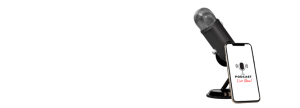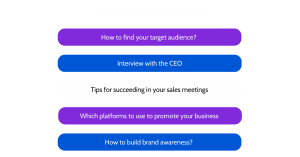How to Start Your Own Podcast
Podcasts were once considered a fringe platform, but in the last decade they have become an essential part of the marketing mainstream. Let’s just look at some fresh statistics that showcase the power and hidden potential podcasts possess! According to a report by Nielsen, 6 out of 10 people understand what podcasts are – what their format is, how they function, etc. – and just in the US alone about 112 million Americans (40 percent of the population) have already listened to at least one podcast in their lives so far.
However, it is not enough to just take in the astounding scope of these numbers! We keep telling our clients and marketer peers alike that the power and potential of podcasts must be harnessed as quickly as possible if we want to reap its enormous benefits. There are millions and millions of enthusiastic podcast consumers out there who listen to podcasts regularly, and a vast majority of them (63 percent, according to a recent Midroll survey!) have made or are likely to make a purchase based on a recommendation of a podcast host they listen to. We say this without any marketing undertone, as it is basically an observable fact: huge profits can be made with a well-setup, quality podcast.
But how exactly should we start this journey? Make no mistake; it’s no walk in the park. You will need to check off a lot of things before you can begin. Fortunately, with coaches like us, by the end of this blogpost you will have a clear concept in your mind!
Why Podcasts?
Providing a diverse range of high-quality content is always an important part of any sustainable and successful marketing campaign that yield competitive advantage to the brand that it serves. However, as it is the case with most such endeavors, marketing agencies as well as the brands that employ them must be smart about the ways they invest their time and energy.
Although blogs are still very popular, audiences are somewhat limited in how and where they can consume them. For instance, it’s not advisable to read a blog at the gym or while driving. However, for agencies and brand to connect with their audience, podcasting provides a great alternative: they can not only personify the brand, but diversify their content channels, allowing audiences to engage with content in their preferred manner.
Before we jump into discussing the know-how, there is one very important thought to keep in mind: podcasts do not necessarily translate into a huge influx of leads. On the other hand, they are incredibly powerful as a lead nurturing content channel. The effects are similar to having an established, regularly visited and read blog with a strong follower base; with an established podcast of a strong foundation of regular listeners you can stand out and be recognized as a thought leader in your industry – which always helps generate more leads.
So don’t think of podcasting as a fix to a shortage in leads! There are plenty of other ways to do something about that. However, just like with blog writing, if you are willing to dedicate the necessary amount of time, effort, and money to get it up and running, podcasting can be tremendously rewarding. Be it increased engagement with your existing customer base, or the elevation of your brand’s visibility and reputation.

Preparing for your first episode
Making the commitment to begin a podcast can be somewhat scary. Until you finally make the decision, you have no idea what to expect. However, if you plan ahead and head off the things that can make or break a podcast, you can ensure a smooth beginning that doesn’t have as many bumps as you would expect.
As with all things in life, it will take practice to become better at it. You will learn the tricks of the trade as you go forward. Nonetheless, we strongly recommend exploring the technology before fully launching your podcast. Don’t hit “publish” until you get the gist of it and are ready to make a plan!
A good and smart way to get the hang of it is to get invited to other podcasts as a guest before launching your own!
What equipment do I need for my podcast?
There is some hearsay out there claiming that in order to do podcasts properly, you will need a full recording studio setup, complete with expensive, state-of-the-art equipment. Fortunately, that’s not the case at all!
Actually, you could start a podcast at this very moment with your cell phone and a free account on a hosting site! It really is that simple. Overthinking the technicalities can be a huge obstacle in the way, so try to avoid it! It will also feel better to just let go off that burden that comes with fretting over the need to go crazy with high-tech equipment. That is not the quintessential factor on which success depends.
Still, there are a few things to consider when you do the shopping for your podcast:
- If your podcast will air on a regular basis, we advise investing in a USB microphone.
- If you will conduct interviews for your podcast, you will need a portable recorder, possibly one that has built-in unidirectional microphones but can still fit in your bag or briefcase.

What to watch out for during recording?
Before pushing that record button, be mindful of your environment!
- Try to avoid background noise! Research or reserve a quiet space to record in beforehand!
- The rustling of notes and papers can be pleasant noise for some, but annoying for others. One handy tip is to tap your list of questions to the wall or table, so that they will not be in your hands which will instinctually start fiddling with them.
- The ticking of a clock ticking in the background might not even register for you, but the microphone can easily pick it up. And once you get to editing the audio, these background noises can easily get distorted, making it distracting for listeners.
- We recommend recording in WAV format: because of the larger file size the quality of the audio can be retained throughout the editing process.
Where to host your episodes?
Here’s a list of popular hosting options:
- SoundCloud
- Stitcher
- Podomatic
- Pandora
- Libsyn
- iTunes
We find SoundCloud to be the ideal option, as it is easy to navigate, and you can also review statistics in it. You can set up a free account in a breeze, and that will provide you with three hours of upload time to work with, which is a fair amount of time to try things out before deciding to invest in it.
For instance, in case your first episodes clocks in at 10 minutes – assuming they are shorter, reaction pieces, for example – you will be able to upload 18 episodes to your free SoundCloud account. By that point you will have had ample amount of time to figure out if this works or not, and your decision on whether to subscribe or not will be all the more informed. And even then, in case you decide to stop regular podcasting, you will still be the owner of an audio library of valuable content you can share with customers and potential leads.
We also found hosting on Libsyn a viable option with some added benefits, specifically their ‘On Publish’ option, which will auto-post your episodes to various channels of your choice. This saves you the effort of having to login to various platforms each time you want to release an episode.
What should I talk about?
Despite the complexities of choosing and applying the technology you will be comfortable with, sometimes the most stressful moments of podcast preparation stem from a simple question: what should I talk about?
No matter what you decide on, the content should always be relevant to your audience! If the topics you are going to talk about resonate well with them, you are absolutely on the right track already. And the rule of thumb for creating relevant, well-resonating content is to make your episodes timely: they should be about issues, matters, and things of interest that are relevant to the present.
So as always, know your buyer personas well! Imagine yourself in their shoes and think about the very things and topics they are generally interested in! Another great way is to directly ask them about what they would like to hear! A poll about the topics of future episodes on one of your social media channels is superb for increasing audience engagement!

How do I edit my episode?
Editing also takes practice – and some patience, too. Start with a software like Audacity – intuitive learning experience, easy-to-use – and you can see how the process works. Homework before pushing that record button for an episode for the first time: make sure you record a few minutes of test audio and then and edit it in Audacity (or any other similar software of your choice) to learn the basics!
Going further, once you are committed to doing regular podcasts and have built up some experience in editing with Audacity, consider upgrading to Adobe Audition! There you will have a much broader selection of options for editing, ensuring a professional standard.
Check out some YouTube tutorials for either one or both editing platforms! They are really helpful.
How should I promote my podcast?
Think of promoting a podcast as promoting a webinar or video channel! It’s basically the same. Email newsletters are a perfect opportunity to draw attention to your podcast, just make sure to draw attention to it with a great CTA! Also, to help drive traffic to your podcast, consider adding a blog sidebar CTA as well!
Co-marketing is another excellent method for promotion. Just like in the case of YouTube creators who regularly have guest spots on each others’ videos as a form of cross-promotion, we can do the same in the podcast realm and partner up with an already established podcast. It will lead to a win-win situation where you co-promote each other’s work. It’s also a superb opportunity to learn more about advanced level podcasting!
An Essential Podcast Checklist
Never been in front of a microphone before? No problem. Just use the roadmap below to get started on the preparation!
- Create a checklist that includes a combination of the following items:
- Who is the target audience?
- Do I want this to be a regular, long-term project, or a shorter one?
- The style of the podcast
- Technical elements (audio equipment, editing software, hosting site, recording location)
- Set up your basic show format: Decide on the composition – how much would the podcast lean towards inviting and talking with guests, and do you want to do some solo pieces as well?
- Leverage your network: The first 10 episodes are vital in setting the tone for any podcast launch. Use your network and ask your contacts to ensure that you line up high-profile, interesting, engaging guests who are not deterred by the relatively small number of your followers at the beginning!
- Track your downloads: Keep an eye on the number of downloads for each episode! That way you can measure ‘success’ – according to your own metrics – and start identifying patterns in your audience’s behavior, giving you important data for improvement!
- Produce great content consistently: If you plan ahead and have great episodes at your disposal, you can cherry-pick which ones to release and which to skip. Before releasing your podcasts publicly, you should have a selection of them in hand – that will provide you the relief of having great content to lean back on in case you don’t have time to do new episodes.
- Become a podcast promoter yourself: Get your buyer personas to listen in! They won’t do it by themselves, so make sure they can learn about your podcast through promotion. Use the company’s email list, social media channels, ask your friends and contacts to share it, too! Request each of your guests the episode they appear in on their own podcasts!
- Monetize your podcast: The obvious way is to promote your book, workshop, online course, or other product, establishing yourself as a thought leader in the process. Don’t be deterred if your audience lacks depth or width in the beginning. Sell advertisements and sponsorships if you can!
Conclusion
The key takeaway? Make up your mind, decide what you want to talk about, then hit “record!” Don’t be afraid that you only have your cell phone and a free SoundCloud account at the beginning! It is a decent way to start and there’s little to fear, as there is only a very little investment other than time at the start. And if you get the hang of it and start making positive waves, you can always take the next steps in advancement to make it a strong content channel for your business.
Yes, it is not easy to break through, but there is plenty of room in this competition. And if you want to avoid rookie mistakes and get ahead in the race, consider turning to coaches who will get you started, help with the setup and train you to be your absolute best once the recording starts.
And at Blackhole Media, we like to pride ourselves as just the right coaches for such podcasting endeavors!


